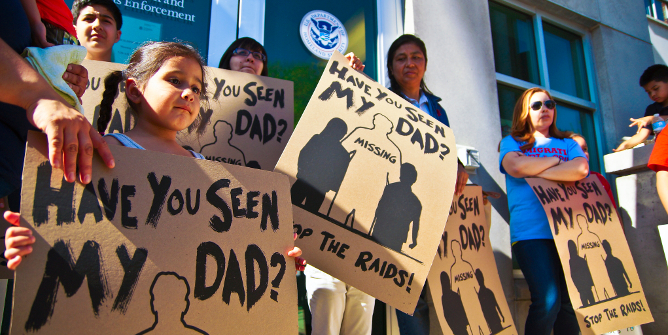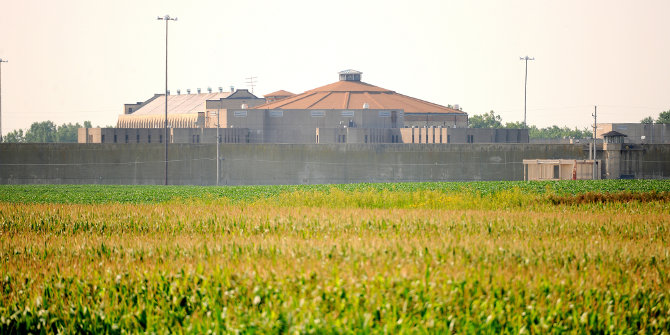 On Thursday, President Obama introduced a plan to provide temporary relief to several million undocumented immigrants, prompting praise from immigrants’ rights advocates and sharp criticism from congressional Republicans. Rachel E. Rosenbloom argues that to get a true sense of the significance of the President’s plan, it is important to consider an aspect that has thus far received less attention: the elimination of the Department of Homeland Security’s “Secure Communities” Program. Taken together, the changes announced on Thursday may point to a rethinking of the policies that have led to the relentless growth of immigration enforcement in recent decades.
On Thursday, President Obama introduced a plan to provide temporary relief to several million undocumented immigrants, prompting praise from immigrants’ rights advocates and sharp criticism from congressional Republicans. Rachel E. Rosenbloom argues that to get a true sense of the significance of the President’s plan, it is important to consider an aspect that has thus far received less attention: the elimination of the Department of Homeland Security’s “Secure Communities” Program. Taken together, the changes announced on Thursday may point to a rethinking of the policies that have led to the relentless growth of immigration enforcement in recent decades.
President Obama has finally delivered on his longstanding promise to take action to fix the broken U.S. immigration system. His plan, announced in a televised speech on Thursday night, does not go as far as immigrants’ rights advocates would like, but it is a big step in the right direction.
Initial reactions to the President’s plan have centered almost exclusively on the main focus of his speech: the announcement of a “deferred action” program for several million undocumented immigrants. The primary beneficiaries of this program will be undocumented parents whose children are U.S. citizens or permanent residents. Deferred action will not provide beneficiaries with permanent status or a path to citizenship – only Congress can do that – but it will lift the immediate threat of deportation and provide temporary work authorization.
The deferred action program is indeed big news, but it is even bigger news when considered alongside another aspect of the President’s plan that went unmentioned in his speech: the termination of the “Secure Communities” program. The Department of Homeland Security (DHS) introduced Secure Communities, or S-Comm, in 2008, touting it as a high-tech solution to the challenges of interior immigration enforcement. S-Comm provides a link between county jails and DHS. When someone is arrested, even if just for a motor vehicle offense, his or her fingerprints are transmitted to DHS, creating a pipeline between local policing and the deportation system.
S-Comm is emblematic of the dominant trend in U.S. immigration enforcement over the past quarter century: the relentless march toward integrating such enforcement with the criminal justice system, in the name of keeping us “secure.” S-Comm has done little to promote security, however. Rather than catching dangerous criminals or terrorists, the program has swept up many people with no convictions at all, or with convictions for nonviolent and often minor offenses. Meanwhile, police chiefs across the country have expressed concern that S-Comm has made undocumented immigrants fearful of having any contact with the police, even when they are victims or witnesses of crimes. In place of S-Comm, DHS will be rolling out a new initiative, the Priority Enforcement Program, which is supposed to limit the police-to-deportation pipeline to cases that fit into a new, three-tiered set of enforcement priorities, focusing primarily on national security threats and criminal offenders.

The President’s decision to end S-Comm, coupled with his creation of the deferred action program, has raised hopes that the tide may be turning on immigration enforcement. Perhaps Obama has finally come to understand what will really bring security to our communities: not an enforcement dragnet but rather the opportunity for undocumented immigrants to come out of the shadows. All of us are more secure, in the end, when members of our communities feel free to report a health and safety violation at work, seek help from the police, or even do something as simple as drive a sick child to the doctor, without fear of deportation.
It is too early to tell, however, how serious the President is about his promise to rethink immigration enforcement more broadly. Any change that gets rid of S-Comm is probably a good one, but there is no guarantee that enforcement efforts will take a more humane and sensible direction. In his speech on Thursday night, the President talked of focusing enforcement efforts on “felons, not families.” This approach may strike many people as uncontroversial: “gang members,” after all, seems like an enforcement priority on which everyone can agree. In reality, however, that “gang member” sometimes turns out to be a person who had a brief involvement with the criminal justice system as a teenager, and now has precisely the type of family and community ties that the President highlighted in his speech. And immigration law employs criminal categories that are notoriously broad, so that even a shoplifting offense or a schoolyard fight can lead someone to be classified under the immigration laws as an “aggravated felon” (another top-tier enforcement priority under both the old and new approaches). The well-documented racial disparities of the U.S. criminal justice system, coupled with immigration law’s Alice in Wonderland approach to defining crimes, should make us wary of any system that relies too heavily on such categories.
In order for our immigration laws to promote secure communities, we will ultimately need far more than executive action. True security will require both a broad legalization program and a return to the case-by-case determinations that immigration judges were permitted to make in deportation cases until Congress stripped them of much of their power in 1996, replacing administrative discretion with mandatory deportation. Only Congress can bring about such changes. In the meantime, however, the President’s plan is an exciting first step, and hopefully signals a broader rethinking of the punitive approach that has characterized immigration enforcement in recent decades.
Please read our comments policy before commenting.
Note: This article gives the views of the author, and not the position of USApp– American Politics and Policy, nor of the London School of Economics.
Shortened URL for this post: http://bit.ly/1qOSloV
______________________
 Rachel E. Rosenbloom – Northeastern University School of Law
Rachel E. Rosenbloom – Northeastern University School of Law
Rachel E. Rosenbloom is Associate Professor of Law at Northeastern University School of Law, where she teaches courses on immigration law, refugee and asylum law, and administrative law. Her recent scholarship has focused on the intersection of criminal law and immigration law, the possibilities and limits of transnational legal advocacy in advancing the rights of deportees, and the role of race and immigration enforcement in the construction of U.S. citizenship.






